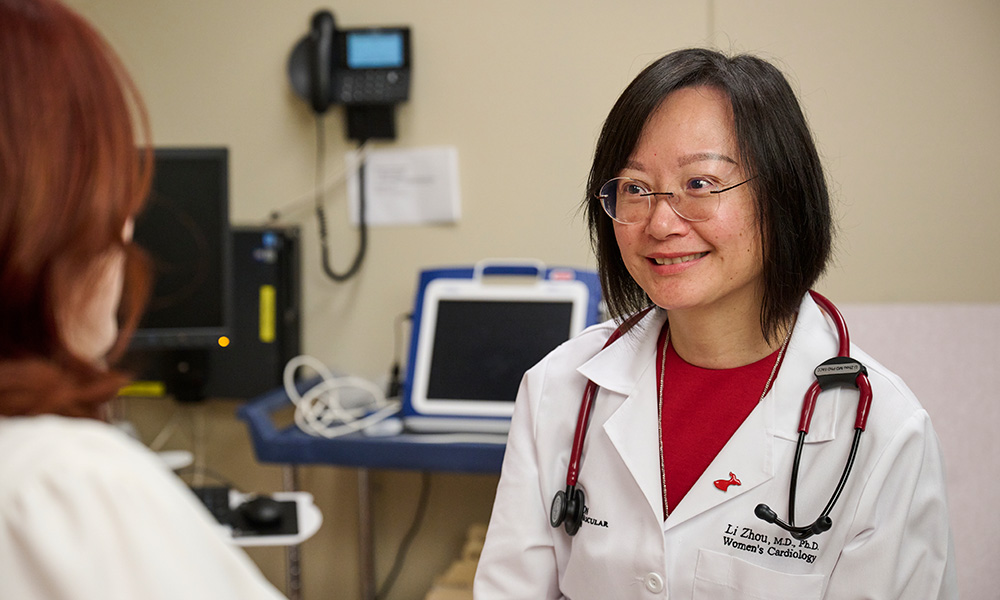Hypertension in women is less prevalent than in men until age 60 and becomes more prevalent afterward.

The risks and consequences of hypertension in women differ from those in men and change throughout women’s lifetimes.
Overall, hypertension in women is less prevalent than in men until age 60 and becomes more prevalent afterward. This pattern may be the result of longer life expectancy, postmenopausal hypertension and lower response rate to treatment.
“Understanding sex differences in blood pressure across a woman’s lifespan is important for diagnosis and treatment,” said Li Zhou, M.D., Ph.D., medical director of the Norton Heart & Vascular Institute Women’s Heart Program.
Hypertension in teenagers and young adult women is often due to a secondary cause. One well-known cause is fibromuscular dysplasia, a nonatherosclerotic arteriopathy that most often affects renal, vertebral and extracranial arteries and may lead to hypertension.
Menarche, the onset of menses, before age 12 is associated with an increased likelihood of developing hypertension in adulthood. Polycystic ovary syndrome also has been associated with the development of hypertension in young women.
Other secondary causes include diabetes and other endocrine disorders, psychological disorders such as stress and anxiety, and pharmacological causes, including antidepressants and corticosteroids.
Current guidelines recommend blood pressure of 130/80 or lower, for all nonpregnant adults.
During pregnancy, blood pressure typically drops for the first two trimesters and then increases in the third trimester.
The U.S. Preventive Services Task Force now recommends checking blood pressure checked throughout any patient’s pregnancy, whether or not the patient has a history of high blood pressure.
For women who have high blood pressure before they become pregnant, they should have their medications adjusted during pregnancy, according to Dr. Zhou.
“It’s very important to have a specialist treating hypertension during pregnancy, because all anti-hypertensive medications cross the placenta to some degree,” Dr. Zhou said.
Hypertension during pregnancy
With pregnant patients, the Women’s Heart Program physicians work with maternal-fetal medicine specialists to help ensure a healthy and smooth pregnancy, labor and delivery.
Hypertension during pregnancy, defined as 140/90 or higher, can be dangerous for both the mother and developing fetus. Severe hypertension is defined as 160/110 or higher.
Refer a patient
To refer a patient to Norton Heart & Vascular Institute Women’s Heart Program, visit Norton EpicLink and open an order for Cardiology.
First-line agents for nonsevere hypertension during pregnancy are methyldopa, labetalol, and nifedipine.
Consequences of hypertension in women
Very high blood pressure can cause heart failure, heart attack, stroke and kidney failure. According to Centers for Disease Control and Prevention data, high blood pressure-related deaths account for 6.8% of pregnancy-related death in women. It also can put the baby’s life in danger.
High blood pressure during pregnancy also can cause preeclampsia, which stresses the heart and other organs and can cause serious complications such as impaired liver and kidney function, or cause fluid to build up in the lungs. Preeclampsia can affect the blood supply to the placenta.
If there are signs of organ damage in the mother, she may need to deliver the baby early, which can result in a preterm birth and low birth weight, according to Dr. Zhou, who co-authored “Hypertension Across a Woman’s Life Cycle,” published late last year in Current Hypertension Reports.
Disorders related to high blood pressure are rising in the United States. The risk factors for disorders related to high blood pressure during pregnancy include being pregnant for the first time, being pregnant with more than one baby, being 35 years old or older, and having a high body mass index prior to pregnancy.
Other risk factors are having a personal or family history of preeclampsia, or having gestational diabetes or chronic hypertension. In addition, Black, American Indian and Alaska Native people are much more likely to both have and die from a hypertensive disorder of pregnancy.
In women 75 and older, 81% have hypertension, compared with 73% of men. This difference may be the result of a greater decline in endothelial function in women due to decreased nitric oxide synthesis after menopause.
Older women, compared with middle-aged and younger women, are also more likely to have severe and uncontrolled hypertension. High blood pressure is associated with cognitive decline in women of all ages.

